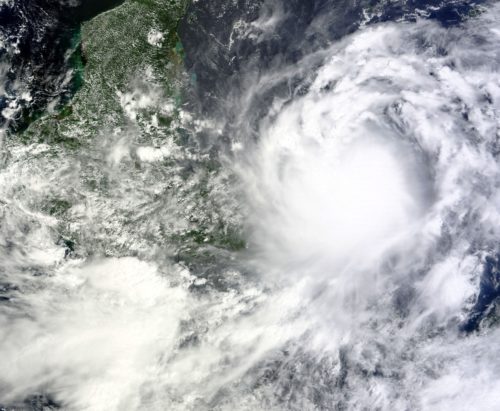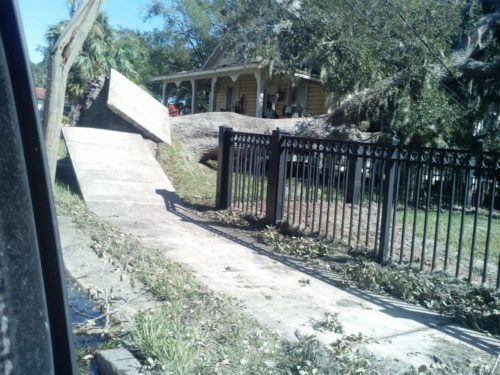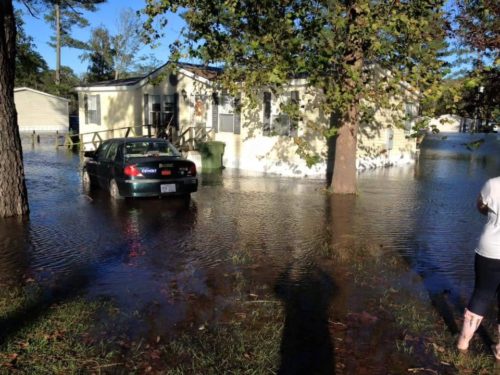UNITED STATES – “We boarded up the house and we left town because our house isn’t (concrete) block construction, it’s wood. We live in an area where there are lots of trees and we weren’t confident that a cat 3, 4, or whatever hit land that we would be safe,” said Kathy Lezon, a priestess from Vero Beach, located on Florida’s Treasure Coast.

Hurricane Matthew 2016 [Courtesy NASA/ GSFC]
Matthew was the first category 5 storm to form in the Atlantic since Hurricane Felix in 2007.
The biggest impact was felt in Haiti, where over a thousand people are now reported to have been killed by the storm. Haiti, which has struggled to rebuild after a massive earthquake struck in 2010, was ill-prepared to withstand a direct hit from Matthew. Without key infrastructure in place and with no protections for personal property, many Haitians were loathe to evacuate their homes. There were also some rumors that Haitians were unaware or only vaguely aware that there was a storm incoming. More on the Haitian relief efforts will follow below.
Meanwhile in the United States the impacts were variable. We spoke with a number of Pagans about their experience. Those in the very southern parts of Florida reported heavy rains and wind with sporadic power outages.
As Matthew’s forecast direction shifted west, then east, then west again with each new update, Floridians were up late into the night on Thursday watching progress. Fortunately, the storm stayed offshore for most of its track along the the U.S. coastline.
Kathy Lezon said that after boarding up her house, she, her partner, and their dog packed up a camper and headed for the west part of the state to stay at a campground.
As of Monday afternoon, she was still waiting on power to be restored at their home. Many houses in Florida, especially in more rural areas, rely on well water which is normally run by electrical pumps. That is what Lezon is facing.
“No electricity means no air conditioning, which is not a big deal if you can take a shower but when your well pump doesn’t work it’s pretty gross, no toilets, no showers,” Lezon said.
Amber Moon, who is also a Treasure Coast resident and police officer, said she worked through the entire storm.
“We had to help with evacuations and shelter security, things like that. I pretty much boarded up my house on Wednesday, sent my 11 year old son to leave the state with his grandmother and I went to work and we’ve pretty much worked straight through. I’ve been at work since Monday (October 3) and will work straight through until Saturday (October 15) which will be my first day off,” Moon said.
Lezon and Moon are both coordinators of the Treasure Coast Pagan Pride Day, which is scheduled for Saturday, October 15. There were some fears that damage to the park would prevent the celebration from happening. But a Facebook announcement on the Treasure Coast Pagan Pride Day event page said, “We hope everyone is okay after Hurricane Matthew. We have just received word that there was no damage at The Savanna’s Recreation Area!!! So, we are a go for Saturday! Spread the word. Come out, relax and enjoy a day off!”

A live oak tree narrowly missed a house belonging to a Mr. Righter in Saint Augustine, Florida. He sat by the tree and sang hymns after the storm. [Courtesy Lupa]
“My home and family were safe, thank Goddess, but I’m in mourning for the town and all its history,” she said.
Lupa shared a photo of an enormous live oak that fell down, ripping up the sidewalk nearby and narrowly missing a house where a man she knows as Mr. Righter lives. She said that it’s a stone’s throw from an entrance to the nearby Florida School for the Deaf and Blind where her parents have worked for more than 12 years.
“He was actually home at the time, having stayed there through it all. My mother and I called him a crazy old coot and sat while he sung a beautiful hymnal (sic) to us, with this huge tree just sitting behind him,” Lupa added..
![A large live oak tree was knocked over in Meg Knunya's neighbor's yard. [Courtesy M. Knunya]](https://wildhunt.org/wp-content/uploads/2016/10/live-oak-500x281.jpg)
A large live oak tree was knocked over in Meg Knunya’s neighbor’s yard. [Courtesy M. Knunya]
“I thought I was prepared,” she said, “we bought a solar panel system and a backup generator for when the power goes out.”
Only right before the storm did she realize that the battery was not installed with the generator, so they wouldn’t have power during or after the storm.
“My plan had been to hunker down in place but then as the storm progressed towards us I started getting a little panicky that they were saying it’s going to be worse than predicted,” Knunya said.
With few options locally, she packed up her two kids, dog, and four cats on Thursday night and tried to drive out of the path of the storm.
“I was totally unprepared for a bug-out situation because it was so last minute. There were no hotels so we slept in the car,” she said. Eventually they settled down in a campground in Georgia where they had to camp with a tarp because in the last-minute scramble to escape, they didn’t bring a tent.
“I found the whole thing very humbling, as Pagans we like to live within nature and honor nature. Sometimes, nature is destructive and nature is terrifying. It really kind of knocks you down and makes you see how insignificant us mere mortals are. I’d like to think some of the warding spells and some of the protection spells I put on my house helped but who really knows. I had no damage, it’s just scary to think that your whole life could just be uprooted in an instant, and you’re not in control,” Knunya said.
Knunya is back home now, where she had some downed branches, though she was trying to figure out how to get to work after a local bridge was down after massive flooding.

Alyce’s covenmate, Wessa O’Wynn provided this photo of flooding in her home in Washington, NC. [Courtesy Photo]
“My friends that live in New Bern, the National Guard evacuated them and they had to spend the night in a shelter, it was not a voluntary evacuation, they demanded that they leave,” said Alyce Rohan, Priestess Initiate of Triskele Rose Witchcraft. Rohan lives about 80 miles away from New Bern in Rocky Point, North Carolina.
Rohan reported that they were still without power as of Sunday night, with no word on when it may be restored.
“I work at General Electric and they closed the plant down on Saturday, which they never do. It’s an aircraft engine parts plant and they never do that,” she said.
Rohan reported that there were some trees down in her neighborhood, including one that had taken out a neighbor’s garage. She said that she placed crystals at the corners of her property and wrote runes on trees which came out mostly unscathed.
During the storm, she said, “I woke up in the middle of the night and when I went out to go charge my phone, something told me not to go outside. I’m very close with the fey in my neighborhood and had a feeling they were doing something to protect the house. It was strange, it felt like I was being protected.”
Social media ended up being a very important organizing tool for many communities.
Rohan said that Facebook was a great tool for checking in, saying, “We have done the ‘count your self safe’ post. And people have been offering help twixt each other. (Private messages) as well. Electronic age, now we all be!”
Similarly, Knunya said that her community in Jacksonville, Florida has been pretty tight throughout the storm. In addition to prayers and energy work, she said, “many have extended their homes to others, offering others in the community either a place to stay, or at the very least a place to store their food or take a shower or use their internet.”
Lezon said that in Florida’s Treasure Coast people were pitching in and offering to assist one another with prep work as well as cleanup and recover.
“People from Miami to Jacksonville kept in touch with how things were going with storm prep and then on Thursday through Friday, kept in touch with each other as the storm moved up the coast. Its really helpful to know there’s a whole line of people looking out for your safety and well being!”
Meanwhile, in Haiti, the situation is different, and remains extremely dire. More than 1000 people have lost their lives there so far and some aid officials have said that some areas of the country are up to 90% destroyed. Now, doctors in Haiti are warning that an outbreak of cholera, a disease spread by contaminated water, is imminent.
“I really left my heart in Haiti in a lot of ways, seeing the pictures that are coming out of Haiti, it breaks my heart,” said Peter Dybing, an eclectic Pagan and chief officer on a national disaster team. He spent time in Haiti after the 2010 earthquake that leveled parts of the country.
![Haiti 2016 after Hurricane Matthew [Photo Credit: UK-DFID]](https://wildhunt.org/wp-content/uploads/2016/10/29561570953_8c9fb00c66_z-500x280.jpg)
Haiti 2016 after Hurricane Matthew [Photo Credit: UK-DFID]
Dybing urged people in the Pagan community to donate, but to carefully consider which organizations they send their money.
“I would strongly urge the Pagan community that I know what’s going on with small nonprofits in Haiti. This is the place where the money’s going to make a difference,” he said.
When making donations, he said that “focused giving” is the most effective.
“Small mobile nonprofits that are already on the ground, they’re already doing good work, [they] are completely involved in the community’s rebuilding. That’s what focused giving is. A great example of how the organization I’m working with now controls costs, when they get a bunch of relief supplies now instead of spending money on shipping containers and imports and all that, they get a volunteer flotilla of boats, sailboats using wind power to bring supplies to this island,” he said.
After a joint investigative piece by NPR and ProPublica found that very little of the money donated to the Red Cross actually found its way to Haiti in the five years following the 2010 earthquake,some are concerned about how or where to offer monetary assistance.
“Large organizations like that have what’s called a long logistics tail. Which means while people are in crisis that it takes weeks, sometimes months for them to set up their infrastructure,” Dybing said.
One frequently-seen post on social media was from people criticizing those who didn’t evacuate. Dybing said that when, “we’re talking about relocating, or moving out of the way we’re talking about people who have resources, that’s a comment that comes from people who have privilege.”
There are no credit cards and if the limited amount of money that people have is needed for something else, their family may not eat for five days, he added.
“There are no soup kitchens or anywhere else you can go to fix that. The choices that people face are incredibly traumatic in staying where they are and protecting the absolute, very little that they have, versus abandoning it and knowing it will all be gone when they come back because their house will be ransacked, unprotected,” Dybing said.
He said that he’s supporting his friend’s group, Good Samaritan Foundation for Haiti.
“(It) has no paid employees except for the local teachers at the school and those are Haitians that are being paid,” he said.
“From the very first moment of the earthquake to this specific moment the small tiny nonprofit on the ground, doing the work, building the schools, feeding the children creating sustainability programs is where ethical money spent on Haiti goes,” he said.
The Wild Hunt is not responsible for links to external content.
To join a conversation on this post:
Visit our The Wild Hunt subreddit! Point your favorite browser to https://www.reddit.com/r/The_Wild_Hunt_News/, then click “JOIN”. Make sure to click the bell, too, to be notified of new articles posted to our subreddit.
Thanks to Peter Dybing for the tutorial on focused giving.
Small point needing correction: People sign hymns from hymnals; they don’t “sing hymnals.”
Yes. The change was made. Thank you.
I have noted that people in Haiti have begged people not to give to the Red Cross, as very little money given after the Earthquake ever got spent in Haiti. Half a billion dollars of donated money only got six homes built. So I would recommend, as Peter Dybing suggested, send your donations to the smaller Haitian charities such as
Good Samaritan Foundation for Haiti, where all the money will benefit the Haitian people directly. Peter has worked with the small charity groups, and knows what he is talking about as to their greater effectiveness.
Hey, this is Wessa O’Wynn. Our house was located in Washington, NC, not New Bern. We were evacuated with our 2 yo at 2:30 am Sat, remained in the crowded shelter til Sun at dawn, then tried heading for safety and almost lost our lives in the raging waters. Our home is still under water and without power.
Apologies, Wessa, Alyce had said New Bern. I’ll update today.
Apologies – evacuated at 2:30 SUN morning